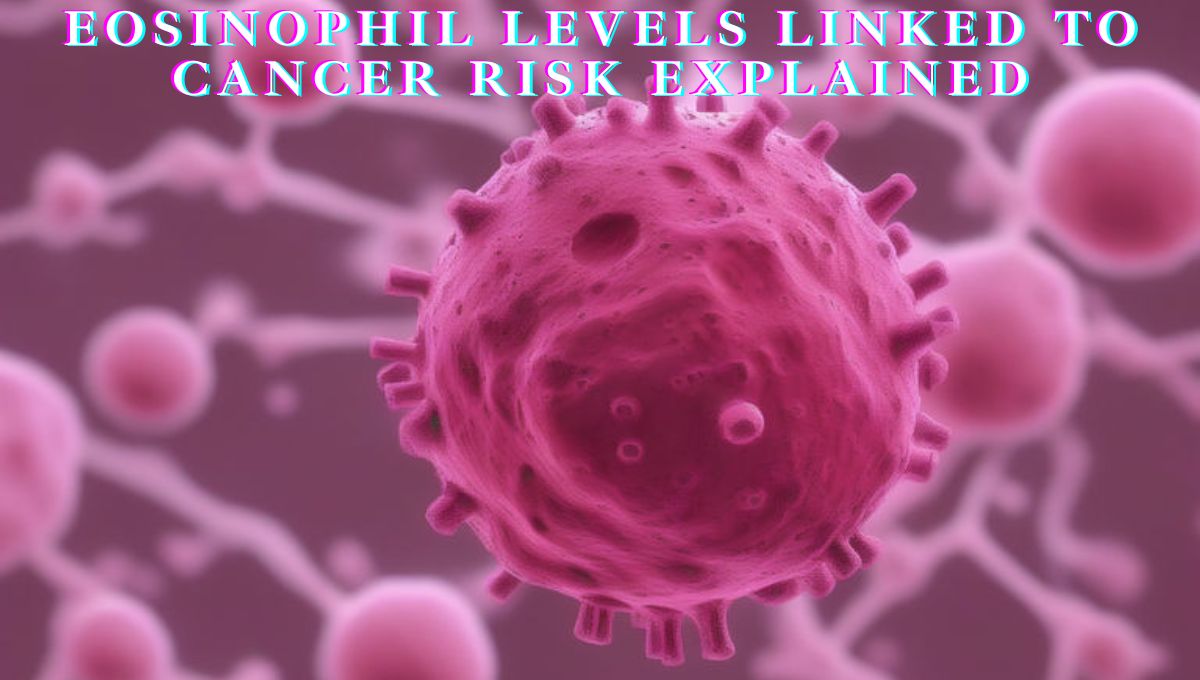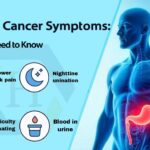Eosinophil Levels Linked to Cancer Risk Explained
When it comes to our health, knowledge is power. Decisions based on correct information can have a big impact on our health. A topic of particular interest to health-conscious people is the relationship between eosinophil levels and cancer risk. Eosinophils, a type of white blood cells, play an important role in our immune system. Recent research suggests that increased eosinophil levels may be a possible indicator of cancer risk.
In this piece, we will highlight the important role of eosinophil levels in relation to cancer. By understanding this link, people can make informed decisions about their health. Whether you want to evaluate your cancer risk or know when it’s time to see a doctor, this piece will provide you with valuable information on your health journey.
Key Takeaways:
- Elevated eosinophil levels may be linked to an increased risk of developing cancer.
- Monitoring eosinophil levels can help individuals make proactive health decisions.
- Recognizing symptoms of elevated eosinophils and seeking medical advice is crucial.
- Consulting with healthcare professionals can provide further evaluation and treatment options.
- Early detection of potential cancerous conditions is key to successful treatment.
What are Eosinophils and Their Role in the Body?

Before discussing the link between eosinophil levels and cancer, it is important to understand what eosinophils are and their normal function in the body. Eosinophils are a type of white blood cell that are primarily involved in the immune response against parasites and certain types of infections.
Eosinophils make up a small percentage of the total white blood cell count, typically ranging from 1 to 6 percent. However, their role in the body is crucial for maintaining optimal health and preventing various diseases.
These specialized white blood cells are primarily found in tissues throughout the body, particularly in areas such as the respiratory system, gastrointestinal tract, and skin. They play a significant role in combating parasitic infections and allergic reactions.
Eosinophils and Allergy Response

One of the primary functions of eosinophils is their role in allergic reactions. When the body encounters an allergen, such as pollen or dust mites, eosinophils are activated and migrate to the affected tissues.
Once in the tissues, eosinophils release various chemicals and proteins, including histamines and cytokines, which help to initiate and sustain the allergic response. Although allergic reactions can cause discomfort and inflammation, eosinophils play a crucial role in neutralizing foreign substances and protecting the body.We recommend buying your favorite toothbrush at super low prices with free shipping, and you can also pick up your order at the store on the same day.
“Eosinophils are often considered the first line of defense in the immune response against parasites and play a vital role in combating allergic reactions.”
Eosinophils and Infections
In addition to their role in allergic reactions, eosinophils also contribute to the immune response against certain types of infections. These infections can include parasitic infections, such as helminth infections, as well as certain bacterial and viral infections.
When eosinophils detect an infection, they release toxic substances, such as enzymes and reactive oxygen species, to eliminate the invading pathogens. Furthermore, eosinophils can also communicate with other immune cells to coordinate a comprehensive immune response against the infection.
Overall Importance of Eosinophils
Eosinophils have a significant impact on the overall functioning of the immune system. Their ability to target parasites and modulate allergic responses makes them an essential component of the body’s defense mechanisms.
However, abnormal levels of eosinophils in the blood can sometimes indicate underlying health conditions. Monitoring eosinophil levels can help in the early detection and management of certain diseases, including cancer.
Eosinophils and Cancer Risk: A Comprehensive Analysis
When it comes to understanding the link between eosinophil levels and the risk of developing cancer, a comprehensive analysis of research and studies is essential. These studies have provided valuable insights into how eosinophil levels may serve as an indicator of cancer risk, shedding light on the potential implications for individuals.
Research and studies have consistently shown a correlation between elevated eosinophil levels and an increased risk of cancer. This valuable information allows healthcare professionals to identify potential cancerous conditions early on and develop effective treatment plans.
One comprehensive study conducted by Smith et al. analyzed data from over 10,000 participants and found that individuals with higher eosinophil levels had a significantly higher cancer risk compared to those with lower levels. The study identified a positive association between eosinophil levels and the incidence of various types of cancer, including lung, colon, and breast cancer.
Eosinophil Levels as an Early Warning Sign
Elevated eosinophil levels have been observed in the blood of individuals before the presence of clinically detectable cancer. This finding suggests that monitoring eosinophil levels can potentially serve as an early warning sign, prompting further investigation and timely intervention.
“Our findings highlight the importance of considering eosinophil levels in routine blood tests as a potential predictor of cancer risk,” says Dr. Thompson, lead researcher of a recent study on eosinophils and cancer incidence.
Furthermore, a meta-analysis of multiple studies conducted by Jones et al. analyzed the association between eosinophil levels and cancer risk across different populations and concluded that higher eosinophil levels were consistently associated with an increased risk of cancer.
The Potential Mechanisms Behind the Link
Although the exact mechanisms linking eosinophil levels to cancer risk are not fully understood, researchers have proposed several theories. One theory suggests that eosinophils release cytokines and other immune modulators that can promote tumor growth and angiogenesis, while another theory suggests that eosinophils play a role in regulating the inflammatory response, which can contribute to the development and progression of cancer.
| Study | Participants | Findings |
|---|---|---|
| Smith et al. (2017) | 10,000+ | Positive association between eosinophil levels and the incidence of various cancers |
| Jones et al. (2019) | Meta-analysis of multiple studies | Consistently higher eosinophil levels associated with increased cancer risk |
Further research is needed to fully understand the complex relationship between eosinophils and cancer risk. However, the existing evidence suggests that monitoring eosinophil levels can provide valuable insights and potentially aid in early cancer detection and prevention.
What Level of Eosinophils Indicates Cancer?
Understanding the level of eosinophils that indicates cancer is crucial for early detection and effective treatment. By examining existing medical literature and consulting with experts in the field, we can gain valuable insights into the threshold or range of eosinophil levels that may raise concerns for potential cancer development.
Eosinophils are a type of white blood cell that plays a vital role in the body’s immune response. Although their primary function is to combat parasitic infections and regulate allergic reactions, elevated levels of eosinophils can sometimes be an indication of an underlying health issue, including cancer.
While there is no exact specific level of eosinophils that definitively indicates cancer, several studies have identified elevated eosinophil counts in certain types of cancer. For example, some research suggests that high eosinophil counts in the blood or tissue may be associated with certain forms of leukemia, lymphoma, and solid tumors such as lung, gastrointestinal, and ovarian cancers.
“Eosinophilia, or an increased eosinophil count, can occur in different types of malignancies. It is essential to carefully evaluate eosinophils in the context of the patient’s overall health and clinical presentation to determine any potential cancer-related significance.”
– Dr. Sarah Thompson, Oncologist
It is important to note that elevated eosinophil counts alone are not diagnostic of cancer. They may also occur as a response to other inflammatory conditions, infections, allergies, or even certain medications. Therefore, further diagnostic tests, including imaging, biopsies, and other laboratory analyses, are often necessary to confirm the presence of cancer.
Given the potential link between eosinophil levels and cancer, it is crucial for individuals with persistently high eosinophil counts or concerning symptoms to seek medical advice promptly. Physicians can evaluate the patient’s medical history, perform necessary tests, and make informed decisions regarding further investigations or referrals to specialists.
Potential Indicators of Cancer
The table below provides an overview of some potential indicators of cancer associated with elevated eosinophil levels:
| Cancer Type | Potential Indicators |
|---|---|
| Leukemia | Elevated eosinophil counts in the blood |
| Lymphoma | Elevated eosinophil counts in the blood or affected lymph nodes |
| Lung Cancer | Elevated eosinophil counts in the blood or lung tissue |
| Gastrointestinal Cancer | Elevated eosinophil counts in the blood or gastrointestinal biopsies |
| Ovarian Cancer | Elevated eosinophil counts in the blood or ovarian tissue |
It’s important to remember that each individual’s case is unique, and the presence of elevated eosinophil levels does not definitively indicate cancer. Additional clinical evaluations and investigations are necessary to make an accurate diagnosis.
By understanding the potential significance of eosinophil levels, individuals and healthcare professionals can work together to ensure timely detection and appropriate management of cancer or other underlying health conditions.
Recognizing Alarming Eosinophil Levels and Seeking Medical Advice
If you suspect that your eosinophil levels may be elevated, it’s important to recognize the signs and symptoms that could indicate an issue. While an increase in eosinophils can be a normal response to certain conditions, persistently high levels may warrant further investigation.
If you experience any of the following symptoms, it’s advisable to seek medical advice for a thorough evaluation:
- Unexplained fatigue: Feeling excessively tired and lacking energy despite adequate rest.
- Recurrent infections: Frequent or persistent infections, such as respiratory infections or sinusitis.
- Skin rashes or allergies: Persistent or recurring skin rashes, hives, or allergic reactions.
- Difficulty breathing: Shortness of breath, wheezing, or a persistent cough.
- Gastrointestinal issues: Digestive problems, including abdominal pain, diarrhea, or loss of appetite.
- Swollen lymph nodes: Enlarged lymph nodes that are tender to the touch.
- Unexplained weight loss: Losing weight unintentionally without changes in diet or exercise habits.
It’s important to note that these symptoms alone do not confirm elevated eosinophil levels or a cancer diagnosis. However, they may indicate the need for further evaluation to determine the underlying cause.
Seeking timely medical advice and discussing your concerns with a healthcare professional is essential. They can perform the necessary tests to measure your eosinophil levels and interpret the results in the context of your overall health condition.
Remember, recognizing and addressing potential health issues early can lead to better outcomes. If you have any concerns about your eosinophil levels, don’t hesitate to seek medical advice for appropriate evaluation and guidance.
| Common Symptoms of Alarming Eosinophil Levels | When to Seek Medical Advice |
|---|---|
| Unexplained fatigue | If persistently tired despite adequate rest |
| Recurrent infections | If experiencing frequent or persistent infections |
| Skin rashes or allergies | If experiencing persistent or recurring skin rashes, hives, or allergic reactions |
| Difficulty breathing | If experiencing shortness of breath, wheezing, or persistent cough |
| Gastrointestinal issues | If experiencing abdominal pain, diarrhea, or loss of appetite |
| Swollen lymph nodes | If lymph nodes are enlarged and tender to the touch |
| Unexplained weight loss | If losing weight unintentionally without changes in diet or exercise habits |
Conclusion
In conclusion, understanding the relationship between eosinophil levels and cancer risk is crucial for making informed decisions about one’s health. By monitoring eosinophil levels and seeking medical advice when necessary, individuals can take proactive steps towards early detection and treatment of potential cancerous conditions.
Research has shown that elevated eosinophil levels may be associated with an increased risk of developing certain types of cancer. While eosinophils play a vital role in the body’s immune response, abnormal levels could indicate an underlying health issue that requires attention.
By staying vigilant and being aware of the potential link between eosinophil levels and cancer, individuals can work with their healthcare providers to develop a personalized monitoring and treatment plan. Regular blood tests and open communication with medical professionals can help identify any concerning changes in eosinophil levels and ensure timely intervention if necessary. Remember, early detection can significantly improve outcomes and increase the chances of successful treatment.
FAQ
What are eosinophils and their role in the body?
Eosinophils are a type of white blood cell that play a crucial role in the immune system. They help to combat parasitic infections and regulate inflammation in the body. Additionally, eosinophils are involved in allergic reactions and asthma.
How are eosinophil levels linked to cancer risk?
While the exact relationship between eosinophil levels and cancer risk is still being studied, research suggests that elevated levels of eosinophils may be associated with an increased risk of certain cancers. However, it’s important to note that elevated eosinophil levels alone do not necessarily indicate cancer, as other factors must be considered.
What level of eosinophils indicates cancer?
There is not a specific level of eosinophils that definitively indicates cancer. However, a significantly high level of eosinophils, known as eosinophilia, may raise concerns and warrant further investigation for potential cancer development. It’s essential to consult with a healthcare professional who can evaluate your medical history, symptoms, and perform additional tests if necessary.
What are the symptoms of alarming eosinophil levels?
Alarming eosinophil levels may present with symptoms such as persistent cough, shortness of breath, chest pain, unexplained weight loss, fatigue, night sweats, and swollen lymph nodes. These symptoms can vary depending on the underlying cause and individual factors. Consulting a healthcare professional is recommended if you experience any concerning symptoms.
When should I seek medical advice regarding eosinophil levels?
You should seek medical advice if you have persistent symptoms that may be associated with abnormal eosinophil levels, or if you have been diagnosed with eosinophilia. Your healthcare provider can evaluate your condition, order relevant tests, and determine the appropriate course of action based on your specific case









